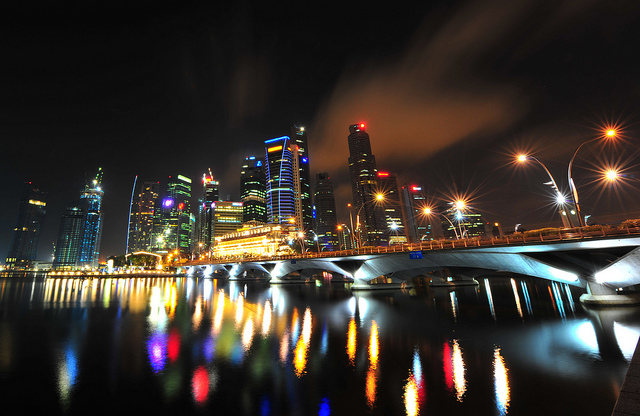 Photo Credit: Flickr User Mike Behnken
Photo Credit: Flickr User Mike Behnken
Pivot to Asia: A Preview of the Official Visit and State Dinner Between Singapore and the United States
This article was written by ASP Adjunct Fellow Catherine Katz.
On Tuesday, August 2, President Obama will host Prime Minister Lee Hsien Loong of Singapore at the White House for an official visit and State Dinner. This meeting marks the 50th anniversary of diplomatic relations between the United States and Singapore, and it is the first State Dinner for a Singaporean Prime Minister since Lee Kuan Yew—the current Prime Minister’s father—visited in 1985 during the Reagan administration. Singapore is the fifth Asian nation, and specifically, the first Southeast Asian nation to receive a State Dinner during President Obama’s administration.
This official visit, furthering diplomatic relations between the United States and a key economic and international security partner situated in the crossroads of the Asia-Pacific region, focuses attention on one of the Obama administration’s strategic priorities: the “Pivot to Asia.”
Given Singapore’s commitment to multiple international security initiatives, the official visit between President Obama and Prime Minister Lee is set to include discussion on climate security, counterterrorism, and trade policy, as expressed in an official White House communication. This diplomatic engagement is sure to address the following international security initiatives:
Paris Climate Agreement: Singapore is one of 179 countries to have signed the 2015 Paris Climate Agreement and is committed to reducing its emissions by 36% of 2005 levels by 2030. Given that its economy is rooted in the financial services and biotech sectors, rather than manufacturing and agriculture, Singapore ranks among the lower range of greenhouse gas-emitting nations; however, given that Singapore is a significant urban center in a region that the State Department notes is home to 15 of the world’s 30 “Megacities,” its commitment to and leadership in the agreement is crucial. As a principal urban center, Singapore’s initiatives in reducing emissions in construction, transportation, and business operations can serve as models for other densely populated areas throughout Southeast Asia.
Counter-ISIL Coalition: The Asia-Pacific region has not been spared from tragic acts of terrorism. With ISIL attacks in Sydney, Melbourne, Dhaka, Jakarta, and recently Kuala Lumpur, Singapore is a dedicated partner in the fight against terrorism in Southeast Asia. In December 2014, Singapore joined the Counter-ISIL Coalition alongside 65 other nations. In April 2016, the Singapore Ministry of Home Affairs arrested eight Bangladeshi workers with suspected ties to ISIL. As ISIL attempts to expand its network throughout the Asia-Pacific region, notably in Malaysia and Indonesia, nations such as Singapore will serve as key strategic partners. The United States and Singapore enjoy strong military relations: Singapore is a participant in the Rim of the Pacific Exercise, and the United States deploys littoral combat ships to Singapore. Expanded cooperation in the international fight against terrorism will only bring the two nations closer together.
Trans-Pacific Partnership (TPP): As evidenced by signs and posters displayed amongst the crowd at the Democratic National Convention last week, the TPP will continue to be a divisive issue in American politics throughout this election season. This controversial policy will be among the chief areas of focus for President Obama and Prime Minister Lee during this week’s official visit. The TPP, which has grown out of the original 2005 P4 agreement between Brunei, Chile, New Zealand, and Singapore, would cut 18,000 tariffs and significantly expand free trade within the manufacturing and agricultural sectors. The TPP also offers significant geopolitical implications. As a financial services hub and the location of over 3,500 American businesses, Singapore’s expanded economic relations with the United States under the TPP would challenge China’s attempts to influence international trade and investment. Alliances with Singapore and other significant trading partners in Asia will further pressure China to liberalize its economy, the second order effects of which Secretary of Defense Ash Carter believes will be as valuable to international security efforts as deploying another aircraft carrier to the region.
Regardless of which party next occupies the White House, relations within the Asia-Pacific region will become increasingly important over the coming decade. Asia is home to 61% of the world’s population and 7 of the top 15 United States trading partners. Through global initiatives like the Paris Climate Agreement, the Counter-ISIL Coalition, and the TPP, the United States and Singapore have enjoyed 50 years of bipartisan relations. This relationship will only become more essential as we look forward to the next 50 years.





